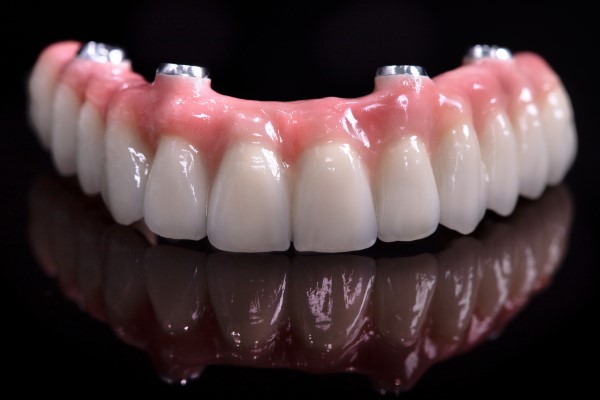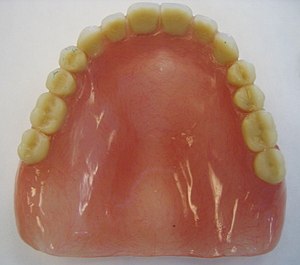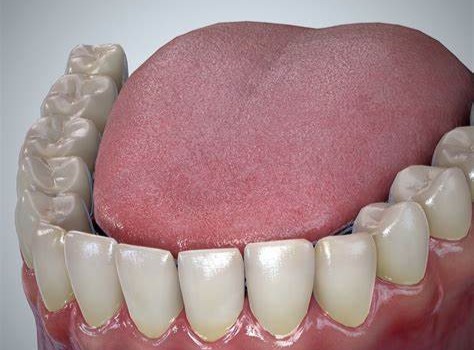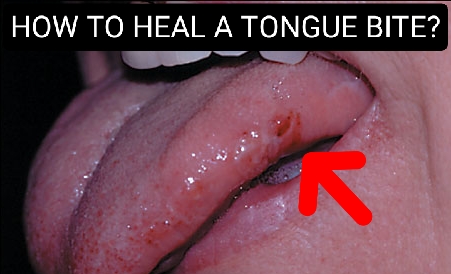When it comes to edentulous patients, there are two types of dentures you can chose from. One is fixed dentures and the other is removable dentures.
In this article, we have discussed both in detail. Read on to know more about the two types of dentures:
FIXED DENTURES
Fixed dentures, are fixed implant-supported dentures. In this case, dental implants are placed in the jaw and Dentures are fabricated that are permanently attached to your dental implants.
After wearing fixed dentures, you don’t need to remove them before going to bed . They look, function, and feel exactly like natural teeth.
They are supposed to be cleaned just like natural teeth.
Generally, fixed dentures need more height and width of bone for support compared to removable dentures, which made them unsuitable for people who’ve bone resorption or bone loss.

Advantages of Fixed Dentures
Stability:
Compared to removable dentures, fixed dentures are anchored firmly with implants which makes them more stable and secure. It enables them to deliver even distribution of biting force and make the users feel more comfortable while eating and speaking.
Aesthetics:
Fixed dentures tend to look natural and aesthetically pleasant. Fixed dentures look just like natural teeth and support facial features, which in turn in enhances the smile and confidence. Their natural appearance makes them extremely popular among people who want to look youthful and natural.
Durability:
Fixed dentures are far more robust and durable than removable dentures. This increases the longevity of an average fixed denture.
Low maintenance:
Fixed dentures need lower maintenance compared to removable dentures. As they don’t need to be removed, they can be brushed and flossed just like natural teeth.
Customized fitting:
Fixed dentures are customized and fitted to provide optimum comfort. They are far more precise and better fitting compared to removable dentures.
Disadvantages of Fixed Dentures
No doubt fixed dentures have several advantages. But they also have some disadvantages that make them unsuitable for certain people. Let’s discuss some of the demerits.
Invasive:
Even though customized fitting is one of their biggest strengths, fixed dentures are fitted after a relatively invasive procedure. They require minimum of 4 implants for denture support and indicated in patients with considerable bone support.
Maintenance:
Maintaining oral hygiene is a challenge As fixed dentures cannot be cleaned as perfectly and efficiently as one can clean removable dentures, they may increase the chances of plaque buildup between teeth and can raise the risk of dental infections and inflammations.
Cost:
Fixed dentures are usually a little more expensive than removable dentures.
But being expensive initially,they turn out to be a good long term investment.
Removable Complete Dentures
TYPES
They are of various types –
Removable implant-supported dentures, which can be removed from teeth before going to bed or cleaning.
Removable dentures are usually made of plastic material with metal clasps that latch onto the teeth. These come in three major types:
Cast metal removable dentures: This type of removable denture has a metal base, usually made up of cobalt-chromium alloy, which enables it to latch onto the natural teeth. These dentures are normally noticeable.
Acrylic dentures-This type of denture is made from a pink-colored material that’s known as acrylic dental-grade resin. These dentures are suitable for people who’ve advanced periodontal diseases and they may lose all of their teeth over a period and have weak frail bone structure. Implants are not indicated in such cases.
Flexible dentures: These are extremely lightweight and more aesthetically pleasing dentures. Been said that, the denture stains easily and is extremely hard to repair.
Merits of removable complete dentures
Removable dentures are the oldest type of dentures and they’re commonly used for their wide range of benefits. Some of them are.
Simple and less invasive: Removable dentures are made with simple and less invasive techniques compared to other tooth replacement options.
Cost-effective: Removable dentures are extremely cost-effective and more value for money than fixed dentures. As these dentures are removed before going to bed and cleaning, the chance of wear and tear due to nighttime grinding and clenching is minimized.
Suitable for people with weak jawbones: People with weak jawbones and people experiencing bone loss are not suitable candidates for fixed dentures. Removable dentures can replace missing teeth and help them to lead a normal life.
Facilitates good dental hygiene: As removable dentures are taken out before going to bed and cleaning the mouth, they facilitate good dental hygiene and oral care. While brushing fixed dentures, the bristles can’t reach hard-to-clean areas such as below the gum lines. But every nook and cranny of removable dentures can be cleaned easily.
Demerits of removable complete dentures
Even though removable dentures have many benefits, they also have some drawbacks. Here are a few disadvantages of removable dentures.
1. Boneloss– There are evidences showing that removable dentures accelerate bone loss which further deteriorates the bone structure.
2. Maintenance – removable dentures must be removed before going to bed or cleaning. It can be a hassle for a busy person.
3. Function: May not function as well as fixed dentures.
4. Lack of anchorage: Unlike fixed dentures, removable dentures don’t have a strong anchorage to bone. The lack of which can cause them to move and shift and can result in instability while chewing and biting.
COST OF DENTURES
The cost of fixed dentures and removable complete dentures can vary depending on several factors, including the materials used, the geographic location of the dental practice, and the complexity of the case. However, on average:
– Fixed dentures (also called dental implants) can cost anywhere from $1,000 to $4,000 per tooth. A full arch of fixed dentures can cost between $35,000 to $60,000.
– Removable complete dentures (also called full dentures) can cost between $600 to $8,000 per arch, with an average cost of around $3,000 to $5,000 per arch.
It’s worth noting that there may be additional costs associated with the fabrication and placement of dentures, such as the cost of consultations, X-rays, and necessary dental procedures (such as extractions or bone grafting).
Furthermore, some dental insurance plans may offer coverage for dentures, so it’s important to check with your insurance provider to understand your coverage options.
Lastly, many dental practices offer payment plans or financing options to help patients manage the cost of dental care. You can speak with your dentist’s office to see if they offer any such options.
Conclusion
When it comes to choosing between fixed and removable dentures, you need to take a lot of things into consideration such as the quality of jaw bone, your overall dental health, and your conditions. A dentist is the best person to recommend the right dentures after performing a thorough examination and imaging.
FAQs
Here are some frequently asked questions (FAQs) about dentures:
1. What are dentures?
Dentures are removable appliances that replace missing teeth and surrounding tissue. They can be made of acrylic, nylon, or porcelain and can be either complete or partial.
2. Who needs dentures?
Dentures are typically recommended for people who are missing multiple teeth or have significant damage and decay in existing teeth.
3. How do I care for my dentures?
Dentures should be cleaned daily with a soft-bristled brush and denture-specific cleaner to remove food particles and bacteria. Be sure to handle them carefully to avoid damage and store them in a clean, moist container while not in use.
4. What are the benefits of dentures?
Dentures can improve your oral health by replacing missing teeth and improving biting and chewing function. They can also restore the appearance of your smile and improve self-confidence.
5. How long do dentures last?
The lifespan of dentures can vary depending on factors such as the material they are made of, how well they are cared for, and the amount of use they receive. On average, dentures can last between 5 to 10 years with proper care and maintenance.
6. Can I eat and speak normally with dentures?
It may take some time to adjust to eating and speaking with dentures, but most people can resume normal activities after a short period of adjustment.
7. How do I know if dentures are right for me?
If you are missing multiple teeth or have significant damage to existing teeth, dentures may be a good option for you. Schedule a consultation with your dentist to discuss your options and determine if dentures are right for your individual needs.



